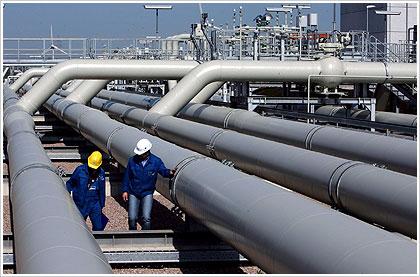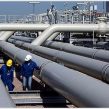
Croatia Hesitates Between EU and Russia on Energy Policy
Publication: Eurasia Daily Monitor Volume: 8 Issue: 71
By:

Croatia hopes to complete accession negotiations with the European Union during the course of this year. However, the government would put its own EU accession goals at risk if it were to re-orient its energy policy toward Russia, or away from EU competition policy. The government seems to be giving just such signals at this moment. It is reaching out to Gazprom again and (in an unrelated move) seeks to restrict Hungarian MOL’s investments in the Croatian INA oil and gas company.
The government has dispatched Deputy Prime Minister (responsible for investments), Domagoj Milosevic, on a visit to Moscow. He is scheduled to meet on April 11-12 with Gazprom CEO Aleksei Miller, Russian oil industry executives, and investment banks. The agenda includes Gazprom’s South Stream project, future supplies of natural gas to Croatia, unspecified cooperation regarding the Adriatic Oil Pipeline, and possible Russian investments in tourism development on Croatia’s Krk Island (location of a major oil import terminal and a planned liquefied-natural-gas [LNG] terminal) (Jutarnji List, March 31; Nacional, March 22, April 5).
Croatia has not met Russian expectations on any of these projects thus far; but came close to it in February of last year. A rush visit by the US Special Envoy for Energy Affairs, Richard Morningstar, to Zagreb, straight from a Central European energy summit in Budapest, helped the Croatian government re-commit to an integrated regional and European energy policy. The government, however, is prone to cyclical bouts of illusion about a Russian energy bonanza descending on Croatia. Consultant Davor Stern, who spent most of his career as INA’s representative in Russia and top adviser to TNK-BP in Moscow, seems influential with Prime Minister Jadranka Kosor at the moment. He claims that “it was Croatia’s fault” that those Russian projects have not materialized in the country thus far. However, if this government changes its policies, “the golden age of cooperation with Russia is yet to come,” according to Stern (Vecernji List, March 24).
Moscow seeks to enlist Croatia into South Stream as a gas recipient country (without a transit role). The offer aims to make the planned LNG terminal on Krk Island look redundant and discourage investors there. That terminal would supply non-Russian gas to Central European countries, so as to dent Gazprom’s monopoly on that regional market. The Adriatic terminal in Croatia is listed by the European Commission as a priority project (along with a counterpart LNG terminal on Poland’s Baltic coast). Just as the hype around South Stream in the Black Sea aims to discourage investment in the Nabucco project, so publicity around extending South Stream into Croatia serves to block the Adriatic LNG alternative.
Russian Prime Minister Vladimir Putin’s March 22-24 tour of three Balkan countries and Slovenia showed these governments behaving (outwardly at least) as the last believers in the South Stream project. They seemed to take at face value Putin’s idea of sourcing South Stream from LNG to be developed on the Siberian Yamal Peninsula, in an undetermined time-frame at undetermined costs, on top of the South Stream project’s own exorbitant costs. They also seemed undeterred by the gap between Putin’s vision (which, in its own way, favors the company Novatek over Gazprom) versus South Stream CEO Marcel Kramer’s accompanying presentations, which adhered to Gazprom’s familiar vision of the project.
Croatian media and expert commentaries do not seem to have caught up to these developments either. Naive expectations regarding South Stream persist in Croatian media and among some key government officials. To bring South Stream to Croatia, certain observers suggest some kind of package deal that could include other projects of interest to Russia.
On April 8, Russian ZarubezhNeft CEO, Nikolai Brunich, was received by the Adriatic Oil Pipeline (Janaf) management and, very unusually, by Croatian President Ivo Josipovic, according to a Russian embassy communiqué in Zagreb. “Long-term cooperation” was discussed, though no agreements were signed. The communiqué also encouraged Croatia to believe that it can join the South Stream project (HINA, April 8).
Russian oil companies are interested in using the Janaf pipeline system, which connects the maritime oil import terminal Omisalj with refineries in Serbia, Bosnia, and Central Europe via Croatia’s territory. Moscow had earlier promoted a different idea: namely, directing Russian oil from the Druzhba pipeline in Central Europe, southward into Croatia’s Janaf pipeline system, for export by tankers from Adriatic ports. This “Druzhba-Adria reversal” concept mirrored the Odessa-Brody pipeline’s reverse-use in Ukraine. More recently, however, GazpromNeft and ZarubezhNeft seek to use the Janaf system for supplying the refineries they have acquired in Serbia and Bosnia. Either way, Russian use of Janaf pipelines could result in blocking the access of tanker-delivered oil supplies from the Adriatic coast to Central Europe.
Russia is in the process of re-routing some oil volumes from the Druzhba pipeline to other export destinations. This shift underscores the importance of an unimpeded flow of alternative oil supplies, via Croatia to Central Europe. However, Russian companies booking Janaf pipeline capacities could eliminate that alternative. Theirs is not simply a business proposal, but also a denial-of-access tactic.
Certain Russian investors seek to acquire land tracts on Krk Island for tourism development. Russian officials from Putin on down have interceded with the Croatian government to authorize those land deals. Some local observers privately express concern that such land acquisitions, in the proximity of the planned LNG terminal, can be used for interfering with that project later on; for example, by claiming that the LNG project would damage tourism and these developers’ business interests.
Moscow now expects the Croatian government to clear up these issues. Moscow senses some confusion in the government’s energy policy. It also seeks to exploit the pre-election atmosphere in Croatia, as the government plans to call elections later this year. In this atmosphere, Moscow seeks to saddle Zagreb with the onus of “improving relations.” To increase Zagreb’s nervousness, Russia has: omitted Croatia from Putin’s March 22-24 Balkan tour (see above); twice postponed (December 2010 and April 2011) President Josipovic’s planned visit to Russia; postponed Russian Energy Minister Sergei Shmatko’s scheduled visit to Zagreb (April 2011); and cancelled Aeroflot’s regular Moscow-Dubrovnik flights for the May-October 2011 tourism season (Nacional, April 5).
At the same time, however, Moscow encourages Croatia to believe that it can attract Russian energy projects to the country. This has prompted Deputy Prime Minister Milosevic’s Moscow visit (see above). Russian companies’ proposals, however, contradict Croatia’s commitments to an integrated regional and European energy policy. Zagreb’s acceptance of such proposals could further complicate Croatia’s desired accession to the European Union this year.




